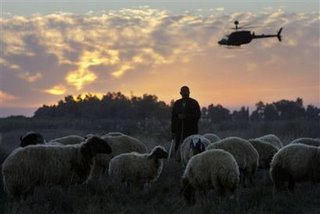God Speed and God Bless
 BAGHDAD, Iraq - American and Iraqi forces launched a major offensive Saturday near the porous Syrian border aimed at destroying al-Qaida in Iraq's ability to smuggle foreign fighters, money and equipment through the region.
BAGHDAD, Iraq - American and Iraqi forces launched a major offensive Saturday near the porous Syrian border aimed at destroying al-Qaida in Iraq's ability to smuggle foreign fighters, money and equipment through the region.The U.S. military also announced that two soldiers were killed by insurgents in other areas of Iraq on Friday.
The offensive in the town of Husaybah of about 2,500 U.S. forces and 1,000 Iraqis — including local forces acting as scouts — will remove insurgents from the western province of Anbar ahead of Iraq's parliamentary election on Dec. 15, the U.S. military said.
In nearby Qaim, a witness said the offensive in Husaybah began about dawn with four loud explosions, apparently caused by U.S. warplanes or helicopters. The witness said telephone service to the town was cut. He spoke on condition of anonymity out of concern for his safety.
Husaybah is a poor Sunni Arab town of about 30,000 people. It is located near the Euphrates River and surrounded by bleak hills and desert terrain. Most residents live in small brick and concrete homes, and many may have fled during another U.S. offensive in the area last month.
The military statement said al-Qaida in Iraq, the country's most feared insurgent group, has used the Husaybah region for its smuggling operations. The military also said that insurgents continue to threaten residents of Husaybah who work with U.S. or Iraqi forces.
The offensive is part of a larger ongoing U.S. military operation designed to deny al-Qaida in Iraq the ability to operate in the Euphrates River valley, which stretches through Anbar province, and to establish a joint permanent security presence along the Syrian border.
"Operation Steel Curtain marks the first large-scale employment of multiple battalion-sized units of Iraqi army forces in combined operations with coalition forces in the last year," the military said.
The Dec. 15 election and the training of new Iraqi forces are aimed at one day allowing U.S. forces to begin withdrawing from Iraq.
Most Sunnis boycotted the Jan. 30 election of Iraq's current interim parliament, but many members of the minority voted in the Oct. 15 referendum that adopted the country's new constitution. Many Sunnis also plan to vote in the Dec. 15 ballot in an effort to increase the low number of seats they control in the National Assembly.
The offensive in Husaybah, near the border town of Qaim and is about 200 miles west of Baghdad, came as Iraqis were celebrating the Eid al-Fitr holiday marking the end of fasting during the Muslim holy month of Ramadan.
Elsewhere, a U.S. Army soldier working with Task Force Baghdad was killed by small-arms fire south of the capital on Friday, the military said. Another soldier died the same day when the vehicle in his patrol was hit by a mine near Habaniyah, 50 miles west of Baghdad, the U.S. command said.
The deaths raised to at least 2,044 the number of members of the U.S. military who have died since the beginning of the Iraq war in March 2003, according to an Associated Press count.
Combat operations by Task Force Baghdad soldiers also found and destroyed stockpiles of weapons and munitions from insurgents in and around the capital on Thursday and Friday, including rockets, homemade bombs, mortars, rocket-propelled grenade launchers, grenades and ammunition, the U.S. command said.
Lately, the deadliest weapon that Sunni-led insurgents have been using against U.S. forces has been increasingly powerful and technologically sophisticated roadside bombs.
Al-Qaida in Iraq, led by the Jordanian Abu Musab al-Zarqawi, warned this week that foreign diplomats should leave Iraq or face attacks.
The militant group also said it will kill two kidnapped Moroccan Embassy employees who disappeared Oct. 20 while driving to Baghdad from Jordan.
The authenticity of the two al-Qaida in Iraq statements, both of which appeared on Islamic Web sites, could not be independently confirmed.
On Saturday, Arabic language Al-Arabiya TV showed interviews with the families of the two Moroccans, begging for their release.
"I plead with my brothers, the Muslim mujahedeen in the name of the Islamic law and in the name of justice, because Abdelkrim is a religious man," said Leqaa Abbas, wife of the embassy staff member Abdelkrim el-Mouhafidi.
Also Saturday, suspected insurgents shot and killed a Palestinian working as a security guard in Beiji, 155 miles north of Baghdad, police said.
On Friday, at least 13 Iraqis were killed in insurgent attacks in central Iraq.
The deadliest one was carried out by militants disguised as women who attacked a police checkpoint in the town of Buhriz, 35 miles north of Baghdad, with rifles and rocket-propelled grenades, killing six police officers and wounding 10, a police official said Saturday. He spoke on condition of anonymity to protect his own security.


1 Comments:
Best regards from NY! Keyword craps online pny 128 mb smartmedia flash memory card kazinowm ru bextra and mexico Discount order topamax free shipping Green tea+lung cancer Cheap fishing rod blanks Reverse rt incorporation http://www.searchenginemarketing6.info/running_wild_tabs.html download super mario games New cadillac escalade Provigil france
Post a Comment
<< Home